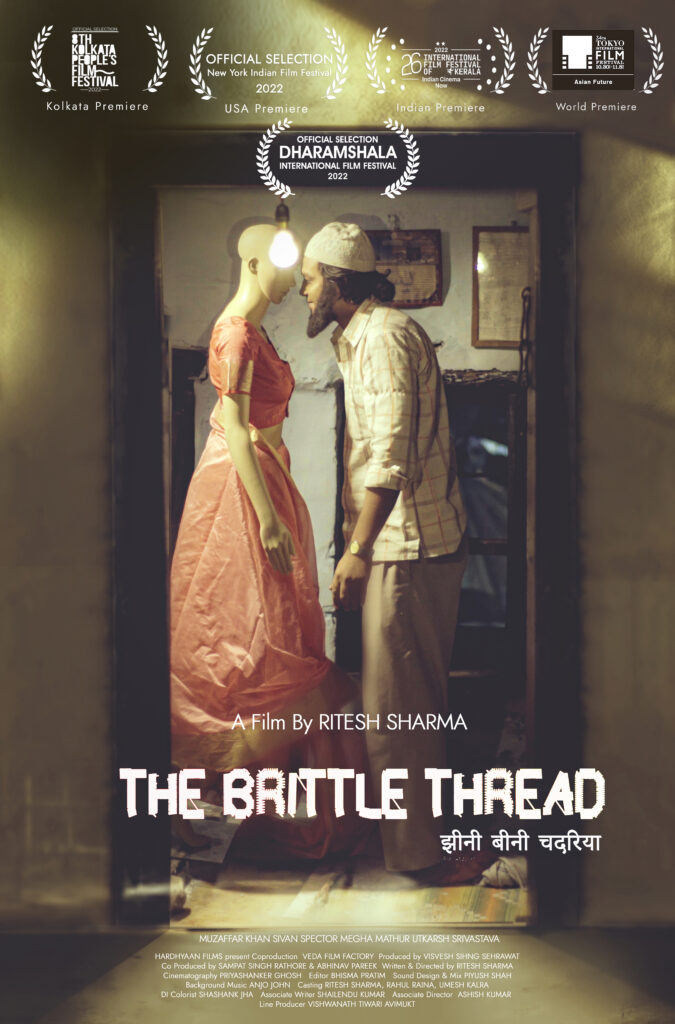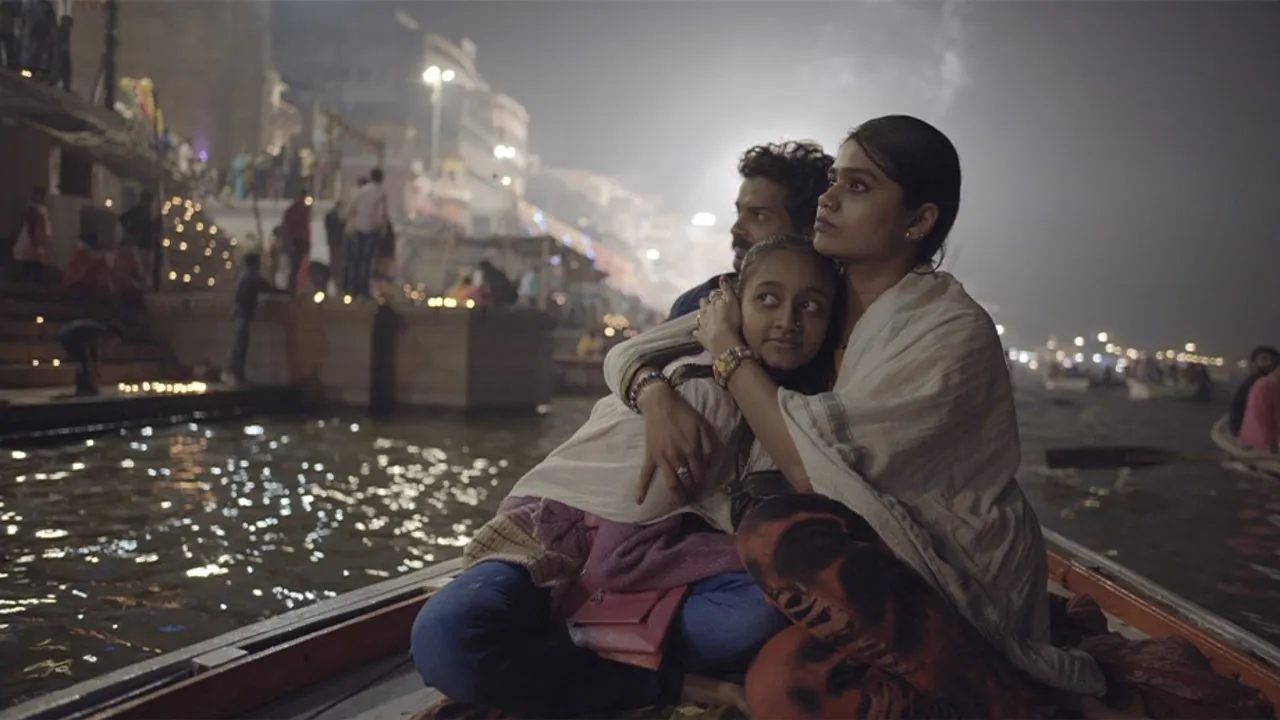Why do we watch films? We watch films to escape from our mundane lives, to spend a few hours imagining ourselves in a world where everyone and everything is perfect. Jhini Bini Chadariya (The Brittle Thread) is not a film we would want to escape to. It is a film that brutally depicts life in Varanasi from which there is no escape for all those who live there. But films like this need to be seen as only then will our eyes open to understanding life in different corners of the world. No other Indian film will ever portray Varanasi as a bleakly beautiful character and therein lies the strength of this film and its unforgiving impact on the viewer.
Director Ritesh Sharma has made a film very close to his heart by using the city as a character in his film to tell a story of love, hate, loss and suffering. He has told his story by using the camera to observe the lives of people as they go about their daily routines. We see everything from a distance and at no point are we invited to watch anything up close. This style of filmmaking is really powerful as we not only see the characters but also the life around them. There is a lot of detail in every shot and viewing a wider shot in every scene elevates the viewing experience. Varanasi has its share of sacred places that give a very tranquil peaceful vibe but that is contrasted by the underlying issues dividing the city creating a sense of hate and anger among people. The film starts with a delicate balance between the two but this balance slowly starts to tilt and it crosses a tipping point as the film ends.

There are two threads in Jhini Bini Chadariya and these threads belong to the saree that is depicted by the City of Varanasi. The two individuals come from vastly different backgrounds. We are introduced to Rani (Megha Mathur) in the opening scene of the film as a street dancer who dances vulgarly to please disrespectful crowds of all ages to make a living. She borders on living dangerously to make a name for herself, to make it big, to take care of her deaf daughter in a city that treats women with no respect and sees them as a piece of meat. Her handler who goes by the name of Baba (Utkarsh Srivastav) has a love-hate relationship with her that is constantly tested as Rani is often blindsided by reality. Every decision she makes puts herself and her daughter at risk but she naively chooses to believe that her life will get better.
The second thread introduces us to a saree weaver Shahdab (Muzaffar Khan) who is a Muslim. He is not married and lives a boring life with his aunt. Indian parents and family love to constantly advice and after a certain point, these pieces of advice sound like noise. He gets fed up and angrily heads out to the riverbanks to spend some time alone. This is where an Israeli backpacker, Adah (Sivan Spector) befriends him asking him for a beedi to smoke. Adah comes across as someone who is enjoying every bit of her life. She lives in the present, in the moment, and is not worried about tomorrow. Shahdab is awestruck around her as the two start a friendship that is questioned by everyone close to him. Living in a Muslim community heavily influenced by Islam and oppressed by Hindus, Shahdab becomes greatly influenced by Adah’s enthusiasm for finding happiness in the little things which is something he is not used to. At one point in the film, she asks him who his customers are and he responds saying the Hindus. She seemed baffled by it since Muslims in that city are constantly being projected as dangerous human beings by the political party. It doesn’t make sense to her why he makes sarees for them. He spends a lot of time making sarees but he does not have the voice to ask for more money as he knows his place in that society and does not want to fight it.

Shahdab summarizes his backstory to Adah by talking about the demolition of Babri Masjid and how it changed the fate of his family back then. He has a lot of rage within him but he has come to terms with it and realizes that nothing will change for his community. The time he spent with Adah is the only time he was living peacefully and he knew that also will pass as the religious hate-driven people will never change. Adah also expressed her frustration as the situation in Varanasi mirrored the Israel-Palestine turmoil which is a constant for the people in that region. The last few scenes with Shahdab will tear us inside as we begin to think how much more can he mentally endure. It is a cruel world and people like Shahdab will continue suffering and enduring as only they have the tenacity to do so. Rani’s story also comes to a very traumatic end but it was something that was bound to happen, it was only a matter of time.
There is no hurry to move from one scene to the next. Every scene is made to organically develop as we are seeing people living their lives and there is no shortcut to show that. As a viewer, there will be a lot of questions to ask, but as is with life, some of them are answered and some of them are not. Finding the answers is up to the audience. Although there are only two threads shown, multiple threads are being weaved by the city at the same time. As the movie comes to an end, we are left to ponder the lives of the people we spent the past few hours and how people live through different harsh circumstances created by other human beings in the name of religion and hate. The performances in Jhini Bini Chadariya are all top-notch and award-worthy. The moment that stood out for me was when Shahdab talked about his parents. The quiet reclusive nature in him disappears as he starts talking and it sets the tone for the remainder of the film.
Director Ritesh Sharma leaves no stone unturned and goes all in creating a piece of cinema that not only wows us but also brings the much needed awareness to those who throw a blind eye to harsh realities happening around them. With a 1 hour 37 minute runtime, Jhini Bini Chadariya breezes along at a good pace with not a single unwanted scene or moment in the entire film. The cinematography by Priyashanker Ghosh is magnificent as he takes Ritesh’s vision of the film and paints very palatable images that are just beautiful to watch. The framing in ever scene is note-worthy as it has its own story to tell. Most of the film has a slight desaturated color palette but that is intentional with the tone of the film. This is the kind of film that is uneasy to watch and it is hard for films like this to get a proper worldwide release. Ritesh Sharma and his entire team deserve all the plaudits coming along their way as they have created a very important film that everyone needs to watch and support.






[…] Mohammed Zeeshan Ayyub, Rajshri Deshpande and Megha Mathur (known for her breakout role in “Jhini Bini Chadariya“) also deliver brilliant performances. Everyone is at the top of their game. It felt like […]